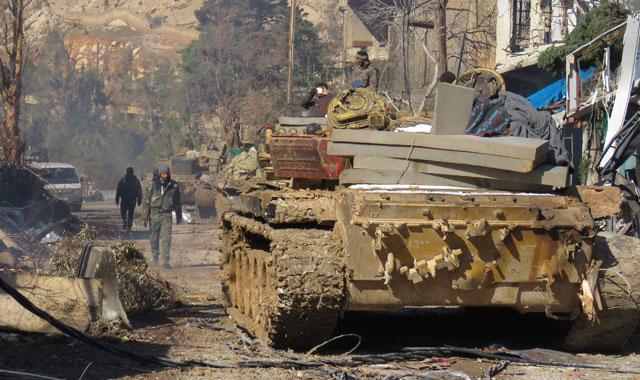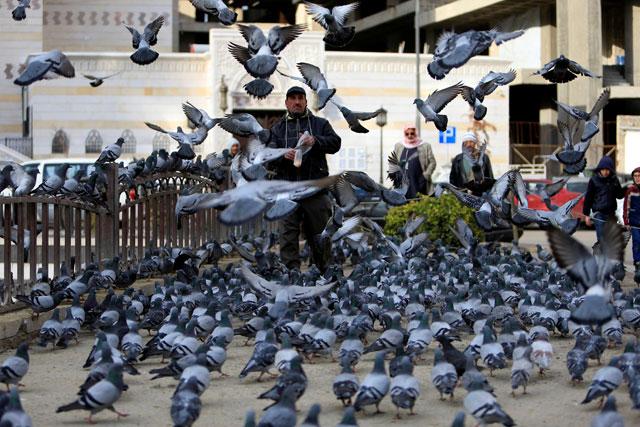You are here
Syria governor says deal reached to restore Damascus water
By AFP - Jan 12,2017 - Last updated at Jan 12,2017

Syrians wait to fill plastic containers with water provided by the Syrian Arab Red Crescent in the capital Damascus on Tuesday (AFP photo)
BEIRUT — Syria's government has reached a deal for the army to enter a rebel-held area near Damascus and restore the capital's water supply, the provincial governor said on Wednesday.
Opposition sources denied there was any such deal, but a source inside the Wadi Barada region reported several hundred civilians were leaving under an agreement.
State news agency SANA also reported people were leaving the region, among them several dozen fighters.
The reported deal comes after weeks of fighting in the region, 15 kilometres northwest of Damascus, which has threatened a fragile truce in place since December 30.
The fighting has damaged water infrastructure and left some 5.5 million people in the capital and its suburbs facing water shortages, according to the UN.
Damascus Provincial Governor Alaa Ibrahim told SANA there was now a deal to allow the government to retake control of the region.
"The agreement that was reached in principle requires the militants to give up their heavy weapons and for non-local militants to leave the area of Wadi Barada," he said.
"[Then] the Syrian Arab Army will enter the area to clear it of mines and bombs to prepare for the entry of maintenance teams... to fix the damage caused to the water pumps and pipes by the terrorists' attacks."
But Ahmed Ramadan, an official with the opposition National Coalition, denied any such deal had been reached.
"This information is untrue and is a part of the [regime and its allies'] psychological warfare," he told AFP.
Civilians leave Wadi Barada
The Syrian Observatory for Human Rights, a Britain-based monitor of the war, also said the government had not reached a comprehensive deal with rebels.
But it reported that residents wishing to leave were being offered safe passage on an individual basis.
And a source on the ground in Wadi Barada said Wednesday that some 600 civilians had left, passing through a makeshift tent where government officials were checking documents.
SANA reported that some 500 people had left the area, among them some 60 rebels.
Syria’s government accuses rebels in Wadi Barada, including former Al Qaeda affiliate Fateh Al Sham Front, of deliberately cutting water supplies to the capital.
But the rebels say regime strikes damaged pumping facilities and deny that Fateh Al Sham, previously known as Al Nusra Front, has forces in the area.
The government has concluded dozens of so-called “reconciliation deals” with rebel-held areas in Syria in recent months, particularly around the capital.
The deals usually offer civilians and rebels safe passage to opposition-held territory elsewhere in exchange for surrendering the area to the army.
The opposition says it is forced into such deals by government sieges and assault, and terms them a “starve or surrender” tactic.
January 23 peace talks
Fighting has continued in Wadi Barada despite the start of a truce brokered by regime ally Russia and rebel backer Turkey in late December.
The ceasefire is intended to pave the way for new peace talks in the Kazakh capital Astana, which Russia confirmed Wednesday were scheduled for January 23.
“At this time there is no indication that the meeting will be postponed. The date of January 23 is set,” a source in the foreign ministry said.
He added that work was underway to compile a list of participants.
A Russian diplomatic source said Wednesday the talks would be held between the regime and rebels only, with the political opposition excluded for the first time.
Regime ally Iran is also helping to organise the talks, which are the latest bid to find a political solution to the nearly six-year-old civil war that has killed more than 310,000 people.
But Turkey and the rebels have warned the ongoing fighting in Wadi Barada could jeopardise the talks in Astana.
And while the truce has brought quiet to large parts of Syria, sporadic violence has continued elsewhere.
On Wednesday, the observatory reported government air strikes in several parts of the Eastern Ghouta region outside Damascus that killed one person and wounded nine.
And overnight it said air strikes hit rebel-held parts of Aleppo and Idlib province in the north and northwest of the country, killing at least three rebels.
Related Articles
DAMASCUS — The Syrian army said on Sunday that it had recaptured a flashpoint area from rebels near Damascus that supplies water to the capi
BEIRUT — The United Nations warned on Thursday that sabotaging water supplies was a war crime after the main source for Syria’s capital was
DAMASCUS — Syria's army on Saturday entered a key water pumping station outside the capital for the first time in four years after a deal wi


















